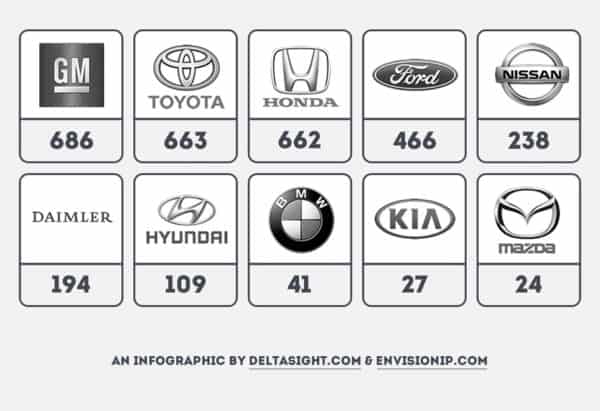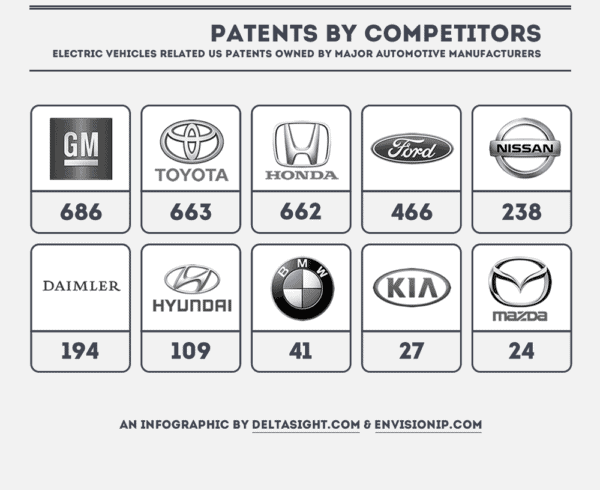
Earlier this month, Tesla announced that it will let other companies use its patented technologies in a move towards open-source collaboration and development of electric vehicle technology. The news made headlines as Elon Musk stated on his blog that “other companies making electric cars, and the world would all benefit from a common, rapidly-evolving technology platform.”
Envision IP partnered with Deltasight to analyze Tesla’s US patent portfolio, in an effort to understand which technologies the company has proprietary rights to. As of June 12th, Tesla had 172 issued US patents, and another 123 published pending US patent applications. It is important to note that this figure does not include any pending, unpublished patent applications filed by Tesla.

120 of Tesla’s patents are related to battery and charging technologies, and not surprisingly, this technology makes up the vast majority of its patent portfolio. Tesla also owns 20 patents related to electric motor and drive control, 10 patents on vehicle frames and chassis, followed by a handful of patents related to doors/latches, air conditioning technology, sunroofs (note the signature panoramic roofs of the Model S), and user interfaces/displays.
While the move to open its patented technology may appear generous, it remains to be seen whether major automotive manufacturers would even need access to Tesla’s technologies. Musk states in his blog that “[a]t best, the large automakers are producing electric cars with limited range in limited volume. Some produce no zero emission cars at all.”
However, while Tesla may not have much competition in the commercial marketplace for purely electric vehicles, automotive giants such as General Motors, Toyota, Honda, Ford, Nissan, and Daimler have all amassed significant patent portfolios related to electric vehicle technology.

Although smaller automotive manufacturers lag Tesla in EV related patents, Tesla is clearly dwarfed by General Motors (686 patents), Toyota (663 patents), Honda (662 patents) and Ford (486 patents) in this area. These companies may not necessarily need, or want, access to Tesla’s technologies, as they appear to have well-established R&D programs and proprietary patented EV technologies of their own.
The opening of Tesla’s patent portfolio will not likely be a catalyst for the automotive industry to make a shift towards purely electric vehicles. Traditional auto manufacturers have already invested significant resources to develop EV technology. It may simply be a matter of time before we see an influx of vehicles in the marketplace which directly compete with Tesla’s line up.
___
Comment
One thought on “Will Big Auto Simply Ignore Tesla’s Open-Sourced Patents?”
Leave a Reply
You must be logged in to post a comment.



 Share
Share Tweet
Tweet Share
Share




The price per kWh is a direct function of patented technologies. Tesla Motors offer significant competative advantage in terms of both capacity and cost. Enabling technologies i.e. Supercharging infrastructure to become the defacto industry standard amongst OEM products is critical.
None of the major automotive institutions have yet developed a commercially available vehicle capable of accepting 120-130 kWh from tge Supercharger network. If EV’s are to defeat all incumbent ICE infrastructure, this will need to be addressed. Thank you for accelerating global development and for investing your valuable time and energy Mr Musk.
Only Mercedes and Toyota vehicles contain Tesla traction packs. Other manufacturers opt for significantly less energy density, capacity and reduced range. Volkswagen’s eup & eGolf offerings, General Motors 16kWh Volt & Cadillac, Mitsubishi’s 12 kWh Phev Outlander, Nissan’s 24 kWh eNV200 & Leaf, Renault’s 22kWh kangoo & zoe, BMW 22kWh i3, Kia’s 24 kWh Soul EV.